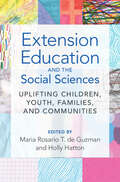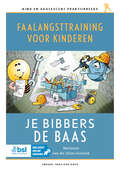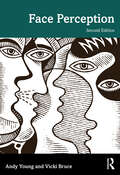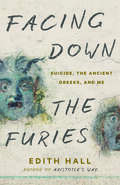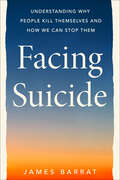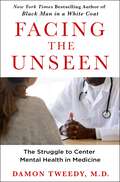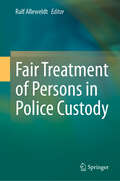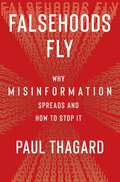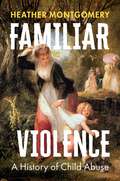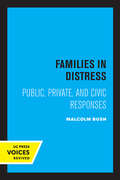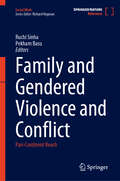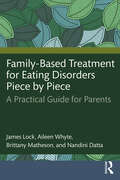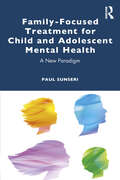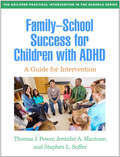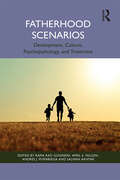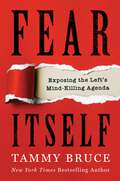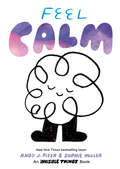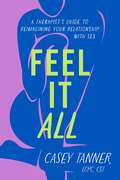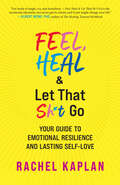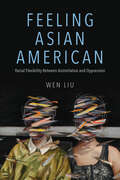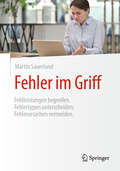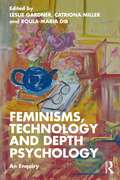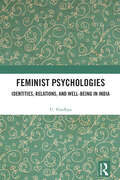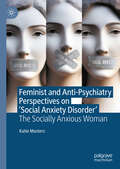- Table View
- List View
Extension Education and the Social Sciences: Uplifting Children, Youth, Families, and Communities
by de Guzman, Maria Rosario T. Holly HattonThe Cooperative Extension System serves as the conduit through which scientific knowledge generated by the 130 land-grant colleges and universities in the United States is translated and delivered directly to its constituents. Since its inception over 100 years ago, Extension has been integral in developing, delivering, and applying cutting-edge knowledge in agriculture and natural resources, youth development, family and consumer sciences, and community and rural development. Today, more than ever, Extension will need to lead the way in building and maintaining sustainable partnerships across disciplines and with organizations at the local, state, and national levels to tackle complex issues considering diminishing resources. Bringing together leading and emerging scholars, this volume discusses how Extension is addressing issues and opportunities relevant to children, youth, families, and communities across the country both now and in the future. Topics include Extension's role in supporting childcare, social media use, entrepreneurship, rural communities, and underserved audiences.
FND Stories: Personal and Professional Experiences of Functional Neurological Disorder
by Gregg H. Rawlings, Markus Reuber, Jon Stone and Maxanne McCormickFunctional Neurological Disorder (FND) is one of the most common diagnoses among patients referred to neurology clinics, but is still misunderstood and under-recognised by medical professionals and the public. This vital book brings together the voices of healthcare professionals and people living with FND across the world. Experts in neurology provide a clear, evidence-based explanation of FND as an introduction, laying the foundation for the personal stories of people with FND and the professionals involved in their care. From testing and diagnosis to dealing with stigma and coping with changing symptoms, each chapter delves into the realities of life with FND from the perspective of lived experience. FND can be an isolating condition. The life stories in this book will help you to make sense of living with FND and tackle its challenges alongside others with the condition.
Faalangsttraining voor kinderen: Je bibbers de baas (Kind en adolescent praktijkreeks)
by Marianne van der Zalm-GrisnichDit boek is een cognitief gedragstherapeutisch (groeps)behandelprotocol waarmee therapeuten kinderen tussen de 9 en 12 jaar leren met hun faalangst om te gaan en deze te verminderen. Dit protocol is door het NJI erkend als ‘goed onderbouwde jeugdinterventie’ en geschreven voor orthopedagogen, kinderpsychologen, gedragstherapeuten en psychotherapeuten. Deze tweede, herziene versie van Je bibbers de baas combineert cognitieve gedragstherapie met ontspanningstechnieken, psycho-educatie en onderdelen uit de Acceptance and Commitment Therapy. Ook komt de rol van mindset aan bod. Verder zijn energizers toegevoegd en is er aandacht voor terugvalpreventie. Ook bevat de handleiding nu een hoofdstuk over gebruik in bijzondere situaties, zoals het voortgezet onderwijs, klassikaal gebruik, individuele inzet en gebruik bij kinderen met ontwikkelingsproblemen. Het protocol bestaat uit tien kinderbijeenkomsten en twee ouder- en leerkrachtbijeenkomsten. Kinderen werken in hun eigen werkboek (apart verkrijgbaar). Voor ouders en leerkrachten is er een online werkboek. Deze en meer online materialen zijn toegankelijk met behulp van een code in de handleiding.
Face Perception
by Vicki Bruce Andy YoungHuman faces are unique biological structures that convey a complex variety of important social messages. Even strangers can tell things from our faces – our feelings, our locus of attention, something of what we are saying, our age, sex, and ethnic group, whether they find us attractive or approachable. Face Perception, second edition, has been thoroughly updated throughout, providing an up-to-date, integrative summary by two authors who have helped to develop and shape the field. The book begins with the foundations of face perception before considering what is known about how we see different things in faces. It concludes with a discussion of how face perception relates to wider questions involving interpersonal perception and re-examines the question of what makes faces ‘special’. The importance of integrating different research perspectives and asking critical theoretical questions is emphasised throughout, to develop a distinctive point of view of the area. Written in a clear and accessible style, this is invaluable reading for all students and researchers interested in studying face perception and social cognition.
Facing Down the Furies: Suicide, the Ancient Greeks, and Me
by Edith HallAn award-winning classicist turns to Greek tragedies for the wisdom to understand the damage caused by suicide and help those who are contemplating suicide themselves In Sophocles&’ tragedy Oedipus the Tyrant, a messenger arrives to report that Jocasta, queen of Thebes, has killed herself. To prepare listeners for this terrible news, he announces, &“The tragedies that hurt the most are those that sufferers have chosen for themselves.&” Edith Hall, whose own life and psyche have been shaped by such loss—her mother&’s grandfather, mother, and first cousin all took their own lives—traces the philosophical arguments on suicide, from Plato and Aristotle to David Hume and Albert Camus. In this deeply personal story, Hall explores the psychological damage that suicide inflicts across generations, relating it to the ancient Greek idea of a family curse. She draws parallels between characters from Greek tragedy and her own relatives, including her great-grandfather, whose life and death bore similar motivations to Sophocles&’ Ajax: both men were overwhelmed by shame and humiliation. Hall, haunted by her own periodic suicidal urges, shows how plays by Sophocles and other Greek dramatists helped her work through the loss of her grandmother and namesake Edith and understand her relationship with her own mother. The wisdom and solace found in the ancient tragedies, she argues, can help one choose survival over painful adversity and offer comfort to those who are tragically bereaved.
Facing Suicide: Understanding Why People Kill Themselves and How We Can Stop Them
by James BarratA deep dive into a national catastrophe that examines how and why suicide happens so that we can prevent itSuicide has reached epidemic proportions in America, claiming over 45,000 lives each year—more than car accidents or homicides. For every person who dies there are about 10 unsuccessful attempts. Yet suicides are preventable, if we can grasp the complex factors behind it and look out for suicide&’s signs in our families, communities, and colleagues. In this groundbreaking book, acclaimed journalist James Barrat delivers these insights with a deep dive into America&’s suicide crisis.With profiles of survivors and their families, and interviews with experts, Barrat assembles a thorough, nuanced portrait of this confounding killer. He examines suicide&’s many risk factors, including genetics, substance abuse, access to lethal means, and mental health. Importantly, he explores how societal issues like racial trauma, bullying, and financial stress – in combination with other factors - can push people to kill themselves. Barrat reveals the structural and chemical differences found in suicidal brains, providing biological insights.Facing Suicide celebrates solutions. Barrat shows how the US Air Force and the nation of Denmark lowered suicide rates with comprehensive &‘systems approaches&’ that enlist every member of society in impactful interventions. Importantly, Barrat finds that 100% of the people he interviewed who attempted suicide are happy they got help and are alive today. Their message is one of healing and hope. With deep reporting and keen insights, Facing Suicide sheds essential light on this painful, growing crises with actionable information about preventing suicides. Barrat's urgent book makes clear that understanding and preventing suicide must be a national priority. We all have a role to play in this vital effort.
Facing the Unseen: The Struggle to Center Mental Health in Medicine
by Damon TweedyFrom the New York Times bestselling author of Black Man in a White Coat comes a powerful and urgent call to center psychiatry and mental health care into the mainstream of medicineAs much as we all might wish that mental health problems, with their elusive causes and unsettling behaviors, simply did not exist, millions of people suffer from them, sometimes to an extreme extent. Many others face addiction to alcohol and other drugs, as overdose and suicide deaths abound. Yet the vast majority of doctors receive minimal instruction in treating these conditions during their lengthy medical training. This mismatch ignores the clear overlap between physical and mental distress, and too-often puts psychiatrists on the outside looking in as the medical system continues to fail many patients. In Facing The Unseen, bestselling author, professor of psychiatry, and practicing physician Damon Tweedy guides us through his days working in outpatient clinics, emergency rooms, and hospitals as he meets people from all walks of life who are grappling with physical and psychological illnesses. In powerful, compassionate, and eloquent prose, Tweedy argues for a more comprehensive and integrated approach where people with mental illness have a health care system that places their full well-being front and center.
Fair Treatment of Persons in Police Custody
by Ralf AlleweldtThis book analyses and evaluates the international efforts to ensure the fair and human treatment of persons in police custody. Respecting the dignity of all detained persons, and in particular preventing torture, is a key issue of international human rights protection. The authors explore various approaches to tackle this issue, including the introduction of investigative, non-coercive interviewing techniques as well as the implementation of fundamental safeguards such as the access to a lawyer and a doctor. Supported by case studies, they describe the special role of national preventive mechanisms and the efforts to improve the treatment of detainees in the context of capacity building activities. Police components of international peace missions face special legal and practical human rights challenges. Authors also ask how the positive potentials and strengths within police organisations could be mobilised for realising human rights, and, last but not least, they seek to assess the prospects of how fair treatment of persons in police custody may be ensured in the future effectively.
Falsehoods Fly: Why Misinformation Spreads and How to Stop It
by Paul ThagardMisinformation is one of the twenty-first century’s greatest challenges, a peril to democracy, peace, science, and public health. Yet we lack a clear understanding of what makes misinformation so potent and why it can spread so rapidly. In Falsehoods Fly, a leading cognitive scientist and philosopher offers a new framework for recognizing and countering misleading claims by exploring the ways that information works—and breaks down.Paul Thagard examines the dangers of misinformation on COVID-19, climate change, conspiracy theories, inequality, and the Russian invasion of Ukraine. He argues that effective responses to these problems require understanding how information is generated and spread. Bringing together empirical findings about the psychological and social mechanisms that drive cognitive errors with philosophical accounts of critical thinking, Thagard develops an innovative theory of how we gain information. Grasping how the generation and transmission of knowledge can fail helps us find ways to repair it and provides tools for converting misinformation into facts. Offering a deep and rich account of the nature and workings of information, Falsehoods Fly provides practical, concrete strategies to stop the creation and spread of misinformation.
Familiar Violence: A History of Child Abuse
by Heather MontgomeryChild abuse casts a long shadow over the history of childhood. Across the centuries there are numerous accounts of children being beaten, neglected, sexually assaulted, or even killed by those closest to them. This book explores this darker side of childhood history, looking at what constituted cruelty towards children in the past and at the social responses towards it. Focusing primarily on England, it is a history of violence against children in their own homes, covering a large timeframe which extends from medieval times to the present. Undeniably, the experience of children in the past was often brutal, and children were treated with, what seems to contemporary mores, callousness, and cruelty. However, historians have paid far less attention to how the mistreatment of children was understood within its contemporary context. Most parents, both now and in the past, loved their children and there have always been widely shared understandings of the boundaries that separate the acceptable treatment of children from the intolerable and morally wrong. This book will examine how these boundaries have changed and been contested over time and, in doing so, provides a context to the many forms of violence experienced by children in the past.
Families in Distress: Public, Private, and Civic Responses
by Malcolm BushThis title is part of UC Press's Voices Revived program, which commemorates University of California Press’s mission to seek out and cultivate the brightest minds and give them voice, reach, and impact. Drawing on a backlist dating to 1893, Voices Revived makes high-quality, peer-reviewed scholarship accessible once again using print-on-demand technology. This title was originally published in 1988.
Family and Gendered Violence and Conflict: Pan-Continent Reach (Social Work)
by Ruchi Sinha Pekham BasuThis reference work collates academic discourses and practices around family, gender, and violence in social work. A huge body of discourse is available that categorizes and labels acts of violence, and correspondingly practices that pin blame/responsibility for the violence. These have led to evolution of intervention strategies to resolve or address the violence. Some explanations foreground systemic causes; others look at person-centric causes. The two views bring forth the fundamental ontological divide of structuralism and individualism. The question for social workers to debate is what to factor in while working with families experiencing violence and conflict. What amongst the person, the agency, or the structure needs to be addressed to understand the experience of families in conflict and violence? Are these positions supplementary, complementary, or to be understood reflexively? With the inclusion of new families, the parochial understanding of families has long been dislodged and given way to newer, radical, and contextual understanding of families. Similarly, different people, agencies, and states understand violence and conflict differently. Gender, too, has moved from the binaries of male and female to the gender-diverse LGBTQIA+ identities. The book positions the ontological premise on which the epistemological practise is located. Simply put, the person-centric ontology on families and violence epistemologically finds understanding in agency-based approaches in individual agency, whereas the structure-based approaches find the experience of families and violence in society, state, and the world order. The contributors locate their work around identification, definition, an intervention or empirical study, policy analysis, historical evolution of concepts, and ontological and paradigmatic debates to position their individual chapters. Family and Gendered Violence and Conflict: Pan-Continent Reach provides a paradigmatic prism for practice for social workers who are equipped to interpret context differently. The differing and competing paradigmatic lenses cannot be mediated, resolved, or addressed, but they definitely can be understood and debated to provide a 360-degree lens on the issues of families in violence in the gendered context. The reference work is a useful resource for social work practitioners, educators, academicians, researchers, and other development professionals.
Family-Based Treatment for Eating Disorders Piece by Piece: A Practical Guide for Parents
by James Lock Aileen Whyte Brittany Matheson Nandini DattaThe book illustrates how parents who are participating in family-based treatment (FBT) for their child's eating disorder (ED) may enhance their chances of achieving optimal outcomes for their child by more successfully navigating the challenges that often impede progress in treatment and recovery.The stance of the book is transdiagnostic, so that the information provided spans all ED diagnoses including anorexia nervosa (AN), bulimia nervosa (BN), binge eating disorder (BED), avoidant/restrictive food intake disorder (ARFID), and atypical ED presentations as well as conditions that fall outside current diagnostic criteria. This book aims to help parents identify how they can make the most out of FBT therapy no matter which ED symptoms their child experiences. Case vignettes across the diagnostic and clinical spectrum are used liberally throughout the book, not only to illustrate examples of some of the specific challenges families face, but to help parents normalize the emotions they may feel around their experience of trying to help their child and around their experience of participating in the FBT intervention itself. A respectful and supportive tone makes this resource accessible and jargon-free for parents, and provides useful information and approaches for psychologists, psychiatrists, social workers, and allied health practitioners who deliver FBT to young people and families.
Family-Focused Treatment for Child and Adolescent Mental Health: A New Paradigm
by Paul A. SunseriThis book is designed as a treatment manual for using family-based treatments with children struggling with mental illness, supporting both family therapists and the families they are helping. Based on over 40 years of research, it has been shown that involving the entire family in treatment is effective. However, family therapy is still not used as a first line of treatment. Paul Sunseri explains and explores why family-based approaches should be used with struggling young people and how this can be applied in practice. Chapters discuss the causes, contributors, and social determinants for the rise in childhood mental illness and provide empirical evidence and treatments for working with children and adolescents suffering from self-harm, suicidal ideation, anxiety, anger, and depression. Filled with case studies throughout, the book also touches on mitigating the effects of screen time in our increasingly technological lives and interventions to help reluctant children participate in therapy. This book will be invaluable reading for graduate-level students, clinicians in training, and fully licensed clinicians, such as psychologists, psychiatrists, marriage and family therapists, and clinical social workers. The book is also a practical resource for parents and other caregivers; it pulls back the curtain on therapy and teaches parents exactly what to do to best love and support their child at a time when they need it the most.
Family-School Success for Children with ADHD: A Guide for Intervention (The Guilford Practical Intervention in the Schools Series)
by Thomas J. Power Jennifer A. Mautone Stephen L. SofferDistilling decades of research, this practical manual presents an innovative intervention for families of 6- to 10-year-olds (grades 1–5) with attention-deficit/hyperactivity disorder (ADHD). Family–School Success (FSS) focuses on improving children's behavior and academic performance by strengthening parent–child, teacher–student, and family–school relationships. Detailed guidelines are provided for implementing FSS with parent groups or individual families, including how to involve children in groups and collaborate with teachers. The authors discuss ways to deliver FSS effectively in school- and clinic-based settings, private practice, and primary care. In a convenient large-size format, the book features dozens of reproducible parent handouts and worksheets, assessment tools, and fidelity checklists, which can also be downloaded and printed. This book is in The Guilford Practical Intervention in the Schools Series, edited by Sandra M. Chafouleas.
Fatherhood Scenarios: Development, Culture, Psychopathology, and Treatment
by Salman Akhtar April E. Fallon Andres J. Pumariega Rama Rao GogineniFatherhood Scenarios offers a wide range of perspectives, including different cultural and ethnic perspectives and chapters considering the role of the father throughout the lifespan, including experiences of gay fathers, adoptive fathers, and disabled fathers.With contributors from around the world representing diverse mental health disciplines, these chapters constitute a harmonious gestalt of knowledge, information, theory, and socio-clinical dimensions pertaining to fatherhood. The emphasis of all these sections is nonetheless the psychosocial tasks of fatherhood as it undergoes subtle and gradual transformation with the offspring’s growth through childhood and adolescence to full adulthood, including becoming a parent themselves. The book also traces the portrayal of fatherhood in popular media including television and movies keeping in mind their evolution and transformation over the past many decades.Spanning a vast terrain of psychosocial concern, Fatherhood Scenarios will be of great appeal to mental health professionals, psychotherapists, child psychiatrists, and family welfare workers in practice and in training.
Fear Itself: Exposing the Left's Mind-Killing Agenda
by Tammy BruceAs progressive policies get more extreme—and challenging them becomes more dangerous—the left expects us to submit to the madness.“Leave this to your betters,” they tell us, as the left and our bureaucratic state refine the weaponizing of fear, gaslighting us into a new normal of chronic dread and anxiety with one goal in mind: unprecedented government control over our lives.COVID, climate change, systemic racism, terrorist parents, identity politics, vandalizing language, cancel culture—from vague designer threats to an endless array of arbitrary rules, the left’s scam to kill our minds follows a predictable pattern:• Cut us off from our friends and family• Gaslight us• Tell us we misremember the past• Break down our confidence• Shame us• Fill us with a fear of everythingIt's time to turn the tables and end this abusive manipulation once and for all. And former liberal activist and Fox News contributor Tammy Bruce shows how. In Fear Itself, you’ll see that none of this is normal nor is it organic. And, most important, you’ll see that it can be defeated. Overcoming the weaponization of fear first requires recognizing it. Once we’re no longer in the dark, defeating it becomes second nature as we take back control of our lives and the destiny of our country.
Feel Calm: An Invisible Things Book (Invisible Things)
by Andy J. Pizza Sophie MillerFrom the creators of the New York Times bestseller Invisible Things, this hands-on board book leads toddlers on a whimsical and reassuring journey from chaos to calm. When you feel wound up, how do you get the knots out? Follow along to unwind the tangled mess of ups, downs, and loop the loops and find the way back to calm. With this book in hand, take a moment to pause, take a deep breath, and practice mindfulness and grounding techniques perfectly suited for young readers.Invisible Things introduced the wonderful concept of exploring the invisible things that make up the human experience, encouraging us to look past the visible and connect with the things that are not seen. This inviting board book brings the idea into an interactive format, offering kids a great way to explore and take charge of their emotions.FEELINGS BOOK: Educators, therapists, and caregivers looking to have nuanced or challenging discussions with kids about their experiences can use this as a jumping-off point for conversation: What are your chaos feelings? What helps you feel calm? SOCIAL EMOTIONAL LEARNING: One common exercise teachers use is to ask kids to point to their emotions on a chart and then name them, for which this book will be a powerful tool. REVIEWED BY MENTAL HEALTH EXPERT: This book was vetted by a licensed independent clinical social worker specializing in mental health for kids. Pair it with the Invisible Things book or Invisible Things Feelings Flash Cards to create an effective home or classroom resource.POPULAR AUTHOR: Andy J. Pizza is one of the creative minds behind several children’s books, including the bestselling Invisible Things, A Pizza with Everything on It, and A Sundae with Everything on It. He also hosts the popular podcast Creative Pep Talk.Perfect for:Parents, grandparents, caregivers, teachers, and educatorsAnyone interested in social-emotional learning (SEL) and entertaining ways to explore emotions with kidsAnyone looking for interactive books about emotional health for babies and toddlersYoung readers who enjoy tactile board books like Press Here and Mix It Up!Fans of Pixar's Inside OutFans of Andy J. Pizza, the Creative Pep Talk podcast, or his bestselling books, including Invisible Things and A Pizza with Everything on It
Feel It All: A Therapist's Guide to Reimagining Your Relationship with Sex
by Casey TannerA groundbreaking guide to sexuality that dispels the stale cultural attitudes about sex that leave too many feeling inadequate, and offers an expansive, attachment-based framework to free us and develop bolder, more satisfying relationships with our sexual selves.When it comes to sex, most people feel insecure. But it’s not because we’re deficient; it’s because we’ve been under-resourced and miseducated. Certified sex therapist Casey Tanner argues that our sex lives are a microcosm of every untruth we’ve internalized about gender, sex, relationships, our bodies, and ourselves. Most of us were taught that healthy sexuality is only for a certain kind of person, in a certain kind of relationship, with a certain kind of body. As a result, the way we’ve learned how to define “good sex” is reflective of how good, worthy, and loveable we see ourselves.Feel It All is a comprehensive guide to help everyone uncover their personal misconceptions about sexuality and relationships. Tanner helps you recognize and assess your core beliefs surrounding relationships, sexuality, gender, and more; identify past trauma; find pathways to healing that work for you; and redefine sex based on knowledge and possibilities, rather than potential consequences.Comprehensive yet accessible, informative, warm, and nonjudgmental, Feel It All provides a pathway for personal healing, creating stronger relationships, and achieving deeper intimacy.
Feel, Heal, and Let That Sh*t Go: Your Guide to Emotional Resilience and Lasting Self-Love
by Rachel KaplanA game-changing approach to emotional health and well-being After suffering profound tragedy in her teens and coping by suppressing the emotions, Rachel Kaplan began a journey of study, therapy, and eventual breakthrough. She knows from experience that many of us avoid actually feeling our feelings. Instead, we store them in a kind of emotional constipation, chasing distraction, addiction, and other forms of suppression. The only way to heal and to live healthier, happier lives is to move the emotions through our bodies. Kaplan presents a revolutionary and irreverent approach to personal transformation and self-care that teaches you precisely how to feel emotions — and release them as nature intended. Doing so is the definitive means for establishing a baseline of well-being and self-trust and overcoming the debilitating effects of core wounds, chronic stress, depression, and backlogged emotional pain. By letting that sh*t go, you can enjoy the life you’re living and know your worth, no matter what.
Feeling Asian American: Racial Flexibility Between Assimilation and Oppression (NWSA / UIP First Book Prize)
by Wen LiuAsian Americans have become the love-hate subject of the American psyche: at times celebrated as the model minority, at other times hated as foreigners. Wen Liu examines contemporary Asian American identity formation while placing it within a historical and ongoing narrative of racial injury. The flexible racial status of Asian Americans oscillates between oppression by the white majority and offers to assimilate into its ranks. Identity emerges from the tensions produced between those two poles. Liu dismisses the idea of Asian Americans as a coherent racial population. Instead, she examines them as a raced, gendered, classed, and sexualized group producing varying physical and imaginary boundaries of nation, geography, and citizenship. Her analysis reveals repeated norms and acts that capture Asian Americanness as part of a racial imagination that buttresses capitalism, white supremacy, neoliberalism, and the US empire. An innovative challenge to persistent myths, Feeling Asian American ranges from the wartime origins of Asian American psychology to anti-Asian attacks to present Asian Americanness as a complex political assemblage.
Fehler im Griff: Fehlleistungen begreifen. Fehlertypen unterscheiden. Fehlerursachen vermeiden.
by Martin SauerlandDieses Buch enthält alles, was Sie über Fehler, Fehlerursachen, vor allem aber über die Möglichkeiten der Vermeidung von Fehlern bei typischen Bürotätigkeiten wissen müssen. Sie kennen es (natürlich nur vom Hörensagen): Die Originalvorlage im Kopierer liegen lassen, eine E-Mail ohne den erforderlichen Anhang versenden, eine vertrauliche Nachricht falsch adressieren, eine Rechnung über 17683 € statt über 17863 € ausstellen oder eine Stelle mit einer inkompetenten Person besetzen – menschliche Fehlleistungen sind ärgerlich, zumeist auch peinlich, zuweilen auch enorm kostspielig. Im Rahmen zahlreicher wissenschaftlicher Analysen sind wir den Häufigkeiten, Typen, Ursachen und Bewältigungsmöglichkeiten solcher Heimsuchungen auf den Grund gegangen. Die Befunde werden auf beispielhafte, anschauliche und amüsante Weise vorgestellt. Der Fokus liegt dabei auf den tieferliegenden motivationalen Fehlerursachen. Die Berücksichtigung dieser energetischen Komponente ermöglicht es nämlich, neue und wirkmächtige Strategien zur Vermeidung von Fehlern in einer immer komplexer und dynamischer werdenden Arbeitswelt zu entwickeln. Die entsprechenden Methoden können von Mitarbeitenden und Führungskräften niedrigschwellig, unmittelbar und selbstgesteuert angewendet werden. Vielleicht ist es durch authentisch-motiviertes Handeln sogar möglich, so etwas wie subjektiv erlebte Fehlerfreiheit zu erreichen. Doch lesen Sie selbst! Zum Autor: Dr. Martin Sauerland, Professor für Arbeit und Organisation an der Hochschule für öffentliche Verwaltung und Finanzen in Ludwigsburg.
Feminisms, Technology and Depth Psychology: An Enquiry
by Leslie Gardner Roula-Maria Dib Catriona MillerFeminisms, Technology and Depth Psychology explores the intersection of a variety of feminist thought with technology through the lens of depth psychology, and investigates how current approaches to technology impact female life globally – from internet use, to biotechnology, to how female creators imagine life.This thought‑provoking collection is a discussion on changing female capacities and creativity. It questions whether female oppression is becoming more easily enabled within the context of technology use, touching on topics of manipulation, ecological awareness, female decision making, and more. Part One is a three‑chapter investigation on queer history, birthing, and reproductive technologies in science fiction novels. Part Two explores images of females and technology in a variety of cultural products ranging from science fiction films to contemporary TV dramas and novels. Part Three looks at the political impact of technology on female worlds, and Part Four examines perspectives on the creative process behind writing science fiction and fantasy. Feminisms, Technology and Depth Psychology will appeal to Jungian analysts and psychotherapists, and analytical psychologists. It also offers insightful perspectives to academics and students of psychology, gender studies, and politics.
Feminist Psychologies: Identities, Relations, and Well-Being in India
by U. VindhyaThis book aims to be a comprehensive resource that will apprise readers of the complex dynamics of the psychological interiors of women and others in the sex and gender spectrum, as they grapple with sociopolitical and cultural constraints. Going beyond the ambit of mainstream psychology, this volume draws from interdisciplinary fields of women’s/gender studies to highlight power imbalances, their intersectional nature, and the ways in which they shape the psychology of gender relations. The book illuminates three focal themes of identities, well-being, and relations, which illustrate the psychological, contextualised in the backdrop of social, political, and cultural developments in contemporary India. The first theme explores the building of identities in the changing dynamics of work–family interfaces, non-normative sexualities, and genders and the intersections of caste, gender, and social hierarchies. The second theme focuses on the gendering of mental health, including the intervention of feminist counselling. The third theme highlights conceptualisations and practices of masculinities and the role of agency, empowerment, and collective action in the pathways to equitable gender relations and social transformation. This book will be of interest to students, teachers, researchers of psychology, and of women’s/gender studies. It will also be useful for anyone who is interested to learn about recent psychological scholarship in India, informed and imbued with a feminist perspective on women as well as other genders.
Feminist and Anti-Psychiatry Perspectives on ‘Social Anxiety Disorder’: The Socially Anxious Woman
by Katie MastersThis book conceptualises the diagnosis ‘Social Anxiety Disorder’ (SAD) in women as a rational response to life in postfeminist, neoliberal, twenty-first century Britain. By speaking to women with this diagnosis, and drawing on the author’s lived experience, it investigates the interplay between women’s social anxiety and Western culture. It argues that societal factors are implicated in women’s mental distress to a far greater extent than dominant (especially psychiatric) narratives would hold—narratives which, premised on individual pathology, often present a biologically reductionist and medicalised account. Through deploying a unique blend of feminism and anti-psychiatry, this book critiques the framework which exists around diagnosing and treating SAD, but without dismissing distress. Inspired by feminist critiques of other gendered psychiatric diagnoses, such as Anorexia Nervosa, it conceptualises ‘SAD’ in women as a ‘culture-bound syndrome’. This book will interest students and scholars of gender studies and sociology.
